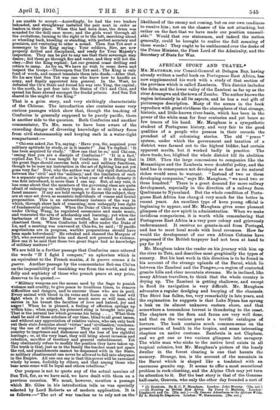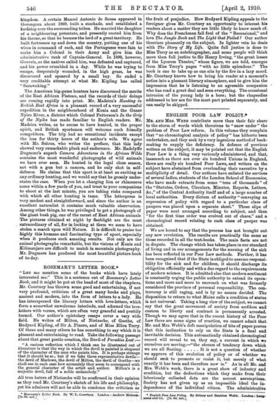AFRICAN SPORT AND TRAVEL.*
Mn. MAUGHAM, our Consul-General at Delagoa Bay, having already written a useful book on Portuguese East Africa, has now supplemented his work with a study of that section of the province which is called Zambezia. This district includes the delta and the lower valley of the Zambezi as far up as the river Aroangwa and the town of Zumbo. The author knows the region intimately in all its aspects, and he has a real gift of picturesque description Many of the scenes in the book reproduce with great vividness the atmosphere of that strange, historic, and little-known river-basin, which has been in the power of the white man for four centuries and yet bears so few traces of his hand. Mr. Maugham is a sympathetic student of Portuguese history, and very fair to the good qualities of a people who possess in their records the proudest of all colonising stories. The old " prazo " system, under which the government and taxation of a district were farmed out to the highest bidder, had certain apparent merits, but it worked badly in practice. The slave trade, too, blighted the whole district till its abolition in 1858. Then the large concessions to companies like the Mozambique and the Zambezia were doubtful polioy, and the land has in consequence not developed so fast as its natural riches would seem to warrant. "Instead of two or three developing companies," says Mr. Maugham, "we need two or three hundred." There is a great demand for more railway development, especially in the direction of a railway from Quelimane to Nyasaland. But the whole condition of Portu- guese East Africa has chang3d very much for the better in recent years. An excellent type of keen young official is beginning to appear, and Mr. Maugham gives some pleasant glimpses of the new spirit in administration. When we make invidious comparisons, it is worth while remembering that Portuguese East Africa is a very poor colony and grievously undermanned. It receives no grants-in-aid from Portugal, and has to meet local needs with local revenues. How far would the development of our own African Colonies have progressed if the British taxpayer had not been at hand to pay for it?
Mr. Maugham takes the reader on his journey with him up the river to Tete, and describes most graphically the types of scenery. But his best work in this direction is to be found in his account of the strange uplands of the Barue, which lie between the Zambezi and the Pungwe,—a region of contorted granite hills and clear mountain streams. He is inclined, like many African travellers, to think that the whole country is drying up. The Zambezi is getting shallower, and except in flood its navigation is very difficult. Mr. Maugham advocates a regular dredging and buoying of the channels. The Shire has fallen, too, very remarkably in late years, and the explanation he suggests is that Lake Nyasa has sprang a leak on its almost unknown eastern shore, and that somewhere a tremendous torrent is thundering to the coast. The chapters on the flora and fauna are very well done, and that on the various pests is a terrific catalogue of horrors. The book contains much common-sense on the preservation of health in the tropics, and some interesting chapters on native customs. Zambezia is not Clapham, and we get one or two curious glimpses into savagery. The white man who sinks to the native level exists in all tropical colonies, but Mr. Maugham's picture of the lonely dweller in the forest clearing is one that haunts the memory. Strange, too, is the account of the mountain in the Barae which is shaped like a toadstool with an enormous granite cap. It seems to offer a most sensational problem in rock-climbing, and the Alpine Club may yet turn its attention to it. But the best story is that of the Goanese half-caste, Gonveia. who only the other day founded a sort of
Britis 2 h B att
• i.1) Ranibesia. By R. C. F. Mini ham. London: John Murray. (158. net.] —) Hunting in . By Percy C. Madeira. London Lippincott and Co. DIA net.)—(B Va,nra Adventures in the African Wilds. By A. Badoiyife Dsgmore. London; W. Heinemann. [30s. net.]
kingdom. A certain Manoel Antonio de Sousa appeared in Gorongoza about 1869, built a stockade, and established a lordship over the surrounding tribes. He married the daughter of a neighbouring potentate, and presently ousted him from his throne, so that he became the lord of a great territory. He built fortresses up and down the country, putting one of his wives in command of each, and the Portuguese were fain to make him a Colonel in their Army and give him the administrative rank of Captain-General. In 1890, however, Gonveia, as the natives called him, was defeated and captured, and his power crumbled in a day. While he was trying to escape, desperately • wounded, in the high grass, he was discovered and speared by a small boy. So ended a very creditable attempt at what Mr. Kipling has called Sarawaking."
The American big-game hunters have discovered the merits of the East African Plateau, and the records of their doings are coming rapidly into print. Mr. Madeira's Hunting in British East Africa is a pleasant record of a very successful expedition in the neighbourhood of Xenia and the Guaso Nyiro River, a district which Colonel Patterson's In the Grip .of the Nyika has made familiar to English readers. Mr. Madeira writes, as he seems to have hunted, in the proper spirit, and British sportsmen will welcome such friendly competitors. The trip had no sensational incidents except the loss for thirty hours of the author's wife. We agree with Mr. Scions, who writes the preface, that this lady showed very remarkable pluck and endurance. Mr. Radclyffe Dugmore's superb Camera Adventures in the African Wilds contains the most wonderful photographs of wild animals we have ever seen. He hunted in the legal close season, not with a gun but a camera, and he only shot in self- defence. He claims that this sport is at least as exciting as any ordinary hunting, and we would say that he grossly under- states the case. When you let a charging lion or rhinoceros come within a few yards of you, and trust to your companions to shoot at the last minute, you are taking risks compared With which all other hunting is tame. The letterpress is very modest and straightforward, and since the author is an excellent naturalist it contains much valuable observation. Among other things, he was privileged to get a photograph of the giant bush pig, one of the rarest of East African animals The pictures obtained at night by flashlight are the most extraordinary of all, for in looking at them we seem to have stolen a march upon wild Nature. It is difficult to praise too highly this humane and fascinating type of sport, especially when it produces such amazing results. Not only are the animal photographs remarkable, but the visions of Xenia and Kilimanjaro are difficult to match in mountain photography. Mr. Dugmore has produced the most beautiful picture-book of to-day.











































 Previous page
Previous page